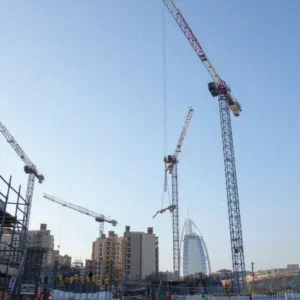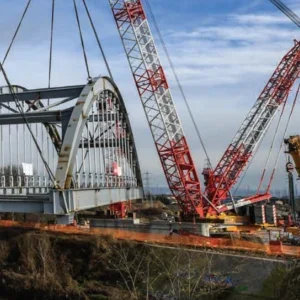Berard is a family business: it has its roots in a deal made by sugar cane farmer Roy Berard Sr in 1945, who was paid $50 to move a friend’s house, using a tractor and homemade trailer. Today, the company is still owned by the Berard family. Roy Sr’s sons Johnny and Randy are president and vice president, respectively. Randy’s son, Brett, is a civil engineer in the operations division, and Johnny’s son, Braedon, is operations manager and head of engineering.
One can imagine an ideal landscape for a special transport company to be looking for work in: developed enough to have miles of convenient roads, but distant enough to be free of obstacles, with a steady, pleasant, climate. Lousiana, unfortunately, is not like that. 450,000 cubic feet of water per second flows from the Mississippi River at Baton Rouge, soaking the surrounding ground, thus reducing its ability to take the thousands of ton weights of ship components and oil and gas modules that Berard’s clients pay it to move. Once Berard does have a job set up, its equipment and its clients loads are, for months at a time, at the mercy of the sort of hurricanes that so recently devastated New Orleans and ravaged the Gulf of Mexico oil industry.
It is hard to imagine how one could argue that starting a special transport company in a place like this is a good idea. But, with strong demand from the oil and gas and shipping industry, and three generations of hard work, the Berard family—like so many others in the Gulf Coast lifting and transport sector—has built a thriving business. Today, the company works across the USA, and is looking to new business in Trinidad and Mexico.
The secret, Braedon Berard says, is building a relationship with customers: “They’re looking for a company they can trust, that can deliver on time, and can handle everything they throw at us at any given time. They feel comfortable with us because we have the latest state of the art equipment, and we can get our projects done on time.
“Our equipment and expertise causes no worries for customers. We take pride in equipment maintenance, getting the job done on time, and most importantly doing the job safely.”
Those relationships are built on engineering excellence. “We focus on heavy transport,” Berard says, “offshore and shipyards are the biggest source of demand. We also operate in the petro and chemical industries. Around 85% of our projects use SPMTs.
“Customers want our engineering expertise: the jobs that are too heavy for others, we want as we are the specialists.
“A good example of the sort of job we do for shipbuilders, is a recent barge job we worked on. The customer wanted to build the barge in shop, so they could keep the price and schedule down, but the shop was too small. They built modules one at a time. Each was 30ftx74ft, and weighed 300USt. We took them out, placed them on supports, and helped to fit them together. Fitting them was a challenge, as space in the yard was limited. But with our equipment capabilities we were able to make turns in really tight spaces to get the job done. The assembled barge weighed 1200USt. We then transported it to the drydock and placed it on stands. We can take vessels to customers own yards, or, we can offer a turnkey service, sourcing a yard for them.
“There are many ways to move. Last week a customer wanted a ship to be made longer. We offered a turnkey service. Berard offloaded the barge, and the customer cut the ship in half. We moved the stern out, so they could bring in the new mid-section, and then we moved the modules back and attached them.
“With hurricane season upon us weather can play a big role. On a recent project in Lafitte, Louisiana, we encountered an episode of bad weather. While on the job, news came in of a hurricane that could possibly be heading our way. With $20m of equipment at the job site, we had to decide whether to take a shot at it.
“We called a 07:00 emergency meeting. I was receiving hourly updates on the weather and closely monitoring the path of the hurricane. If it was due to hit, the job would have to be postponed. It is a challenging and gut wrenching time during hurricane season.
“Back in 2005, hurricanes Katrina and Rita taught us some very expensive lessons. The storms brought massive flooding to our area. We had never encountered that sort of flooding before. On one job, during Rita, we were able to get our crew out in time, but had to leave the equipment at the customer’s yard. When we returned after the storm, our equipment was under 8ft of water.
“South Louisiana is marshland. Marshland as you know equals soft ground conditions. When dealing with SPMTs which have wheel sets that can turn a total of 270°, operating on these ground conditions can be tricky. When you’re on soft ground, that turning will cause you to dig into the ground, and get stuck. To compensate, we travel with several sheets of steel plate, ready to be laid out where the conditions may not be adequate. The SPMTs spread the load well, so we only need to use plate that is 3/8in thick and are approximately 6’ x 20’.
“At Berard, we are faced with challenges on a daily basis, but with the skill and knowledge of our engineers and key personnel we can overcome any task at hand. We are a 3rd generation family owned and operated business. The fundamentals of safe and effective moving and rigging procedures have been passed down from generation to generation. Berard has the equipment together with the skill set and over 65 years of experience to handle your projects on time and with a safety attitude that makes us an industry leader in the field of heavy transport.”






